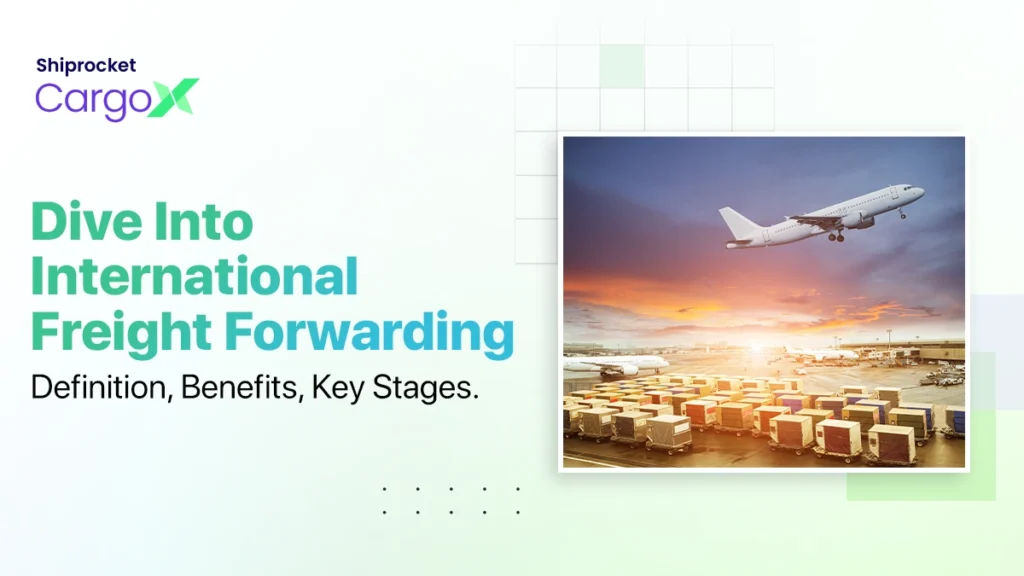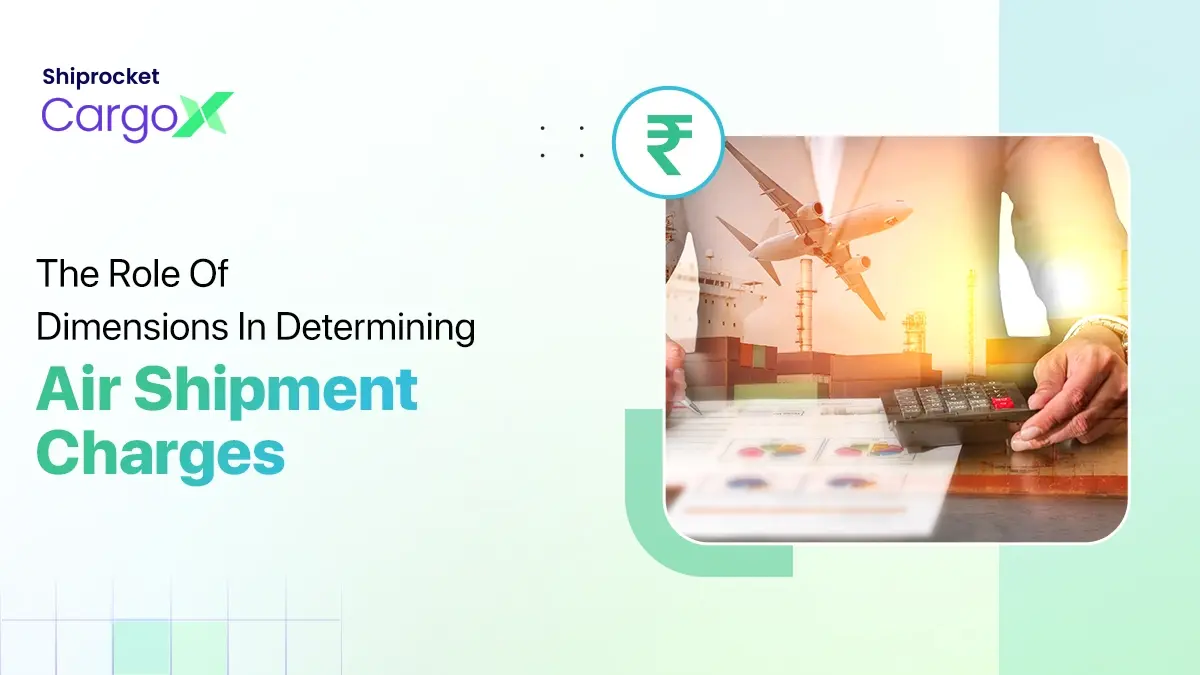International Freight Forwarding: Definition, Benefits, & Key Stages
- Understanding the Role of Freight Forwarders
- Responsibilities and Tasks of Freight Forwarders
- What is the Difference Between Freight and Logistics?
- Key Stages of Freight Forwarding: How Do They Work?
- Benefits of International Freight Forwarding
- Challenges in Freight Forwarding
- Emerging Trends Shaping the Industry
- CargoX: Enhancing Your International Air Cargo Shipping
- Conclusion
Freight forwarding refers to planning and coordinating the flow of goods across international borders on behalf of the shippers. It involves many other tasks, like supplying cargo insurance, warehouse and logistics planning, and customs brokerage. Besides that, a freight forwarder deals with negotiations in freight rates, customs documentation, container tracking, and freight consolidation.
Businesses involved in export and import are required to make strategic logistics plans for hassle-free and efficient international shipping. This is because the logistics game for cross-border shipping is quite complex. It requires various licenses and certificates for international freight forwarding and a profound knowledge of customs regulations, protocols, and standards that may be different in each country. International freight forwarding also requires the shipper to have a creative problem-solving knack to pitch in ideas when the weather is unfavorable, or there are technical or other issues that can probably halt the transit. Besides those capabilities, the shipper must be a good networker to manage healthy relationships with suppliers and other parties in the supply chain.
The flourishing international trade and globalization are the force behind the growth of the international freight forwarding industry. In 2022, the value of the freight forwarding market was USD 191.6 billion. It is expected to grow at a CAGR of 4% between 2023 and 2032.

Understanding the Role of Freight Forwarders
An International supply chain is an integral part of the international freight forwarding process. The operation is complicated as it demands the freight forwarder to have the right expertise and knowledge to execute the import-export process. Many times, businesses find it difficult to deal with all the documentation and networking required for international freight forwarding. This is where a freight forwarder steps in to handle the intricate processes involved in this international supply chain. They handle various activities, including customs brokerage, cargo scheduling, warehouse planning, and cargo insurance. A freight forwarder is either an individual or a company that extends international freight forwarding services to businesses dealing in export/import or international shipping.
When businesses hire freight forwarders, they look over, coordinate, and organize the movement of commodities throughout the international freight forwarding process, on behalf of the shipper. These agents find the right carrier (an entity responsible for transporting the commodities to the final destination) for the shipper (a party that arranges the goods for shipment). The carrier has a simple and clear set of responsibilities; to transport goods from the destination of origin to the final destination, whether through air, ocean, or land. Comparatively, freight forwarders have a very dynamic set of responsibilities. They efficiently handle the entire process to ensure the smooth sailing of the goods. Thus, freight forwarders act as a bridge between the carriers and the shippers in the logistical network. Their tasks include, but are not limited to, freight rate negotiations, freight consolidation, shipment tracking, customs clearance, taking care of any relevant documentation, and other miscellaneous tasks.
These international freight forwarders have the essential expertise to manage cross-border logistics professionally. This means that businesses can ship products internationally hassle-free, knowing that their customs documentation is being prepared and processed by expert freight forwarders. These agents are also adept at managing the movement of shipments according to the specific regulations in each country. Moreover, they have the right information regarding the commercial invoice, bill of lading, shipper’s export declaration, and any other documents a carrier might need for international freight forwarding.
Many freight forwarders today provide an end-to-end solution that involves shipping the products from the origin to the final destination while offering additional services like warehouse planning, custom brokerage, and cargo insurance. These agents have real-time information regarding the movement of shipment, with consistent tracking throughout the transit. Some freight forwarders may also be experts in a specific niche like pickup and deliveries around a port and railroad freight.
Responsibilities and Tasks of Freight Forwarders
The scope of responsibilities for international freight forwarders is many that they constantly need to follow throughout the international freight forwarding process:
- Tracking Shipments: The duties of a freight forwarder begin with this most basic activity that brings transparency to the international freight forwarding process. They employ a Transportation Management System (TMS) to manage and maintain visibility at each stage of the shipping journey. Tracking the shipment keeps the freight forwarder updated with real-time information relating to the whereabouts of the shipment. It ensures that the goods reach the final destination on time and in perfect condition.
- Customs Brokerage: The forwarder needs to ensure a license for customs brokerage, which is a critical part of international freight forwarding. This is important because only a licensed customs broker is qualified to handle and process the hefty documentation required for executing the export and import of goods from one country to another.
- Negotiation With Carriers: A resourceful aspect of international freight forwarders is that they get shippers the best freight rates with their negotiation skills. They bargain with carriers on the shipper’s behalf for cost-effective freight rates. They appeal to the interests of the carriers to negotiate the price by adjusting the pros and cons of the shipper’s cargo type, credit status, time flexibility, space requirements, and more.
- Warehouse Planning: Another crucial responsibility of a freight forwarder involves warehouse planning. It’s the forwarder’s responsibility to arrange for a warehouse for the shipper, in a nearby place that is convenient for the shipper to access when shipping goods. The distance of the warehouse matters, as a shorter distance, makes it easier to transport goods to the port. However, some forwarders may offer self-owned warehouses to harbor shippers’ commodities or parts of commodities for international freight forwarding.
- Arranging Cargo Space: Then comes the role of cargo space scheduling, which involves a productive calibration, coordination, and scheduling of the space required for the shipper’s cargo. These are the tangible aspects of a forwarding agent’s services. When you hire a freight forwarder for international freight forwarding, this is where their role comes in as a strategic logistics planner. They work out effective plans to ensure that consolidating a shipment is profitable for the shipper. It helps the shipper manage timely sailings and analyze the feasibility of the shipping modes to use for international freight forwarding.
- Consolidating Freight: A freight forwarding company or individual service provider may be dealing with many customers at a given point in time. All these shippers may need to transport shipments that do not use the full shipping container. That’s when the international freight forwarder needs to consolidate the freight. These forwarders provide the service of consolidating freight for less-than-container-load (LCL), where they ship several small consignments in the same container. In such a scenario, all the respective shippers divide the cost of the international freight forwarding through one container, depending on the cargo space each one requires.
- Insuring the Cargo: Last but not least, the forwarder is also responsible for providing cargo insurance to concerned parties. The forwarding agents are eligible to provide the shipper with a cargo insurance policy, which is also called freight insurance. The purpose of this freight insurance is to reimburse the loss bearer in case there is any loss of goods or damage during transit.
What is the Difference Between Freight and Logistics?
As these terms are frequently used together, freight and logistics may sound the same, but there is a considerable difference between them. Freight covers the method through which the shipment or goods move. It means what modes of transport are you using for international freight forwarding? These shipping modes can be air or ocean freight.
On the other hand, logistics plays the role of transferring goods from one point to another. This refers to the act of international freight forwarders, where they manage the movement of goods throughout the supply chain. Such duties involve transferring the goods from and to the warehouse and providing other related services.
Key Stages of Freight Forwarding: How Do They Work?
Freight forwarding companies usually do not have their shipping transport, like airplanes, ships, or trucks, which they use for international freight forwarding. Even the big players in the international freight forwarding industry have no self-owned shipping vessels. They are only a bridging agent between several shippers and carriers willing to export and import products. As a forwarding agent, they simplify the international freight forwarding process for the businesses that hire them. They take full responsibility for being the connecting source from the starting point and throughout the shipping process to the final destination.
Here’s how freight forwarders execute the international freight forwarding process at each stage:
- A freight forwarder will first analyze and establish the credit of a client. Then, the agent will move on to inquire about the mode of transport the client wants to use for shipping their goods. The client will have a few options to choose from, like air or ocean freight, to export or import their products.
- After deciding the mode of shipping or freight, the forwarder further will have to figure out the specifications, weight, and dimensions of your cargo to offer services accordingly. You’ll require less-than-container-load (LCL) services if your cargo is less than the load of the container. But if the shipment is fit for full-container-load (FCL) services, the forwarder will examine the type and size of the container needed to accommodate the load. These measurements will also give the forwarder an idea of the space your cargo requires.
- As the forwarder has an accurate record of your shipping and cargo requirements, in the next step, they will calculate the cost, set the rates, and evaluate the documentation. To ensure the collection of complete documents from the seller, the agent will run a check on all the necessary paperwork to identify and rectify any issues or errors. After reviewing all the documents thoroughly and getting everything in line, the forwarding agent will draft the House and Master Bill of Lading. Once they cut the bills, they will schedule the transportation of your shipment.
- These freight forwarders track the shipment throughout the process to give the parties real-time updates. So, when the shipment finally reaches customs, the forwarder intimates the concerned party about the arrival of the shipment. After the cargo clears customs, the forwarder makes arrangements for transporting goods to the final destination and raises an invoice upon delivery.
Benefits of International Freight Forwarding
The most significant benefit of having a freight forwarding partner is that the forwarding agents simplify the complicated process of international freight forwarding. Along with the process, they make shipping of bulk international orders easy and cost-effective.
Another advantage is that the businesses can avail all international freight forwarding services under one roof. Freight forwarding companies are a one-stop shop for efficiently handling exports and imports. You can find warehousing solutions with freight forwarding firms, get the necessary insurance and customs documentation sorted, and receive real-time updates on the movement of the shipment. As a third party handles all these processes for you, it saves you time and possible delays during international freight forwarding.
Freight forwarders also help businesses manage their freight smoothly and easily with a single invoice for combined international freight forwarding services.
Challenges in Freight Forwarding
Some of the challenges with freight forwarding are:
- Today there is a heightened emphasis on sustainability and eco-friendliness worldwide. The surge in this trend is especially seen in European countries. These nations are imposing strict regulations on emissions and alternative fuels. However, they still face considerable challenges regarding implementing these initiatives and the costs involved in executing them.
- The geopolitical unrest in many regions can impact international freight forwarding. This is because conflicts in regions like the Red Sea can disrupt traditional shipping lanes. It may require the industry to stay vigilant and be adaptable to the changes and challenges that may occur due to these conflicts.
- Consumer behavior has also evolved since the dominance of online platforms like social media. These trends are changing and reshaping the market dynamics. The evident changes may present both challenges and opportunities for the international shipping industry.
- As businesses attempt to be socially responsible and adopt sustainable approaches, the implementation of these initiatives poses a lot of challenges. There is a fragmented approach within the industry and a slow transition to emerging technologies.
Emerging Trends Shaping the Industry
Change is inevitable in every industry, and so is it for the freight forwarding industry. Regardless of where you’re conducting your international trade, eCommerce, or retail business, cargo movements are globally interconnected today. This interconnectedness means that you need to stay updated with the trends in the international freight forwarding industry and how they can affect your business operations. Here are five big emerging trends in the freight forwarding industry:
Adapting to the Sustainability Initiatives
Businesses are experiencing a drastic shift in the thinking and buying behavior of consumers around the world. More and more people want to conserve the environment and shop from businesses that follow sustainable practices. Needless to say, environmental threats and concerns, like carbon emissions and climate change hazards, are growing by the day. Therefore, organizations worldwide must showcase social responsibility and sustainability in their supply chains to keep pace with the changing demands.
Recently, a few big companies took the initiative of voluntarily reporting the amount of carbon dioxide they’re pumping out. Perhaps, this move may push other shipping lines to do the same. Businesses can minimize the carbon footprint of their supply chains by scrutinizing their import and export carriers and optimizing their shipping routes.
Adjusting to the Shifting Trade Landscape
The trade routes for shipping and international freight forwarding go through continuous shifts and changes. The global trade dynamics keep evolving with new treaties opening up markets or imposing sanctions for some. Firms need to stay abreast of these developments. However, deciphering their implications on shipping, space availability, and schedules may be immensely time-consuming and energy-draining for businesses.
Freight forwarders are the shield against these unexpected disruptions resulting from new trade pacts, free trade agreements, or restrictions in key import or export markets. They have a strong global network and can guide you through the international freight forwarding process.
Nations Focusing on Security Challenges
Many terrifying and destructive global events like terrorist attacks or activities compel nations to take strict security measures on their ports. Consequently, they may also impose stringent regulations on shipping lines, shippers, and freight forwarders. They alter the shipping norms to ensure the safety of their country. As terrorist threats persist globally, more nations are instituting stricter security protocols. This can potentially disrupt businesses whose cargo fails to meet the destination-specific requirements. Freight forwarders who stay ahead and are adept at complying with the mandates can conduct international freight forwarding seamlessly and safely.
Navigating Through Industry Consolidation
Owing to the fierce competition that businesses face, shipping lines and freight forwarders are prone to consolidation pressures. Many firms resort to measures like opting for operational mergers to gain a better consolidating capacity and bargaining power. While some firms that lack consolidation capacity get acquired by larger rival companies. These market dynamics can assert a significant influence on future pricing for freight. However, a reliable international freight forwarder can keep you abreast of these shifts and their potential impacts on your business operations and financial outcomes.
Digital Transformation in Supply Chains
Digitization has almost become the norm for every industry and business in this new digital age. Following suit, the shipping industry is embracing digitization with equal enthusiasm. The industry is catching up on digital trends by installing software to conduct shipping procedures, inventory management, warehousing activities, and other day-to-day operations in international freight shipping. They are minimizing labor and manual paperwork in the export-import and shipping processes to have more control and accuracy. Hence, there is a growing reliance on digitized documentation and electronic information exchange throughout the supply chain.
Even though some operations in your supply chain may be manual to date, the trend is shifting rapidly toward digitization. So, you must expect your freight forwarder to be able to manage digital information through appropriate technology and tools.
Artificial Intelligence (AI) is on the rise and is rapidly being integrated by all leading businesses. It will be no surprise that very quickly AI will also find its way into the freight forwarding industry making major impacts on efficiency and automation.
CargoX: Enhancing Your International Air Cargo Shipping
Shiprocket’s CargoX is your dependable international logistics service for moving your large shipments across borders. We serve more than 100 overseas destinations and ensure timely B2B deliveries. The compelling features you will find with our service are:
- Instant Quote
- Pick-up within 24 hours
- Digitalized procedures
- Total visibility of shipments
- Lucid invoices
- Simple record keeping
- No unstated fees
- No limitations on weight
- Vast network of couriers
- Superior conflict resolution
Conclusion
The demand for international freight forwarding is growing due to the increasing need for cross-border shipping by businesses dealing in international trade. Shipping internationally is no easy task, with constantly changing mandates, custom regulations, inefficient and cost-heavy shipping routes and so much more. In a domain of constant fluctuations and uncertainty, freight forwarders act as your inside man, helping you optimize your entire supply chain, from minimizing transportation costs to handling the customs and finding you the most efficient and cost-effective shipping routes. They are the lighthouse in the treacherous foggy winter sea that helps you navigate your way to a successful business.
A company has the option to ship its goods through air, ocean, or land transport. This choice depends on the size, weight, and dimensions of the shipment. The mode of transport also depends on where you want to ship your products; it could be domestic or international shipping. There are four types of freight movement routes: air cargo (airplanes), rail (trains), road (trucks), and ocean (cargo ships).
The use of API-based integration solutions is becoming increasingly popular among businesses and freight forwarding companies as these API solutions enable real-time processing instead of batch processing. Logistics companies can strategically implement APIs to target real-time information and updates for shipments and customer orders. Moreover, firms can also send these updates to their trading partners and customers.
Any kind of business can use freight forwarding services and benefit from them. Many companies are using these services, but mostly, the businesses involved in international shipping or catering to international bulk orders hire freight forwarders. Some of the industries that commonly use freight forwarding services include manufacturing, pharmaceuticals, medical, eCommerce, and construction.




